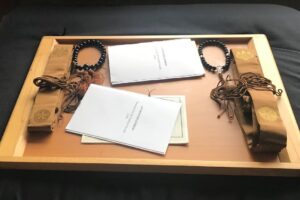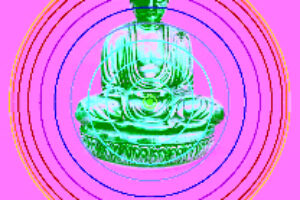
When I received a note suggesting the issue indicated by the title as a subject for this essay, at first I did not know which primary entity was the target of the anger the person confessed. Primary what? A Significant Other? A First Cause? It slowly dawned on me that the Presidential Primaries must be the culprit. This should not be taken to imply that I am so out of it — blissed out, or losing gray matter — that I am not keenly aware of the elephant in the room, trumpeting on to 1600 Pennsylvania, and trampling everything in its way in the process. It is just that the English Language (see Anguish Languish; Howard L. Chase) is such, that a word like primary can mean a lot of things, functioning as a noun, an adjective, or a title. Anyway, that’s my excuse, and I’m sticking to it.
We in Zen (isn’t that a chummy expression) are not supposed to “indulge in anger,” as the Precept would have it. So when we feel anger building, with only the vaguest notion of the real reasons why, and with everyone around us being infected with the same virus, we are conflicted, to say the least. Especially when the debate, excuse the expression, has sunk to such a new level. At least we have not been treated to sextings of nude body parts — not yet.
Just this week I was a plenary speaker on a panel at Kennesaw State University (KSU), at their Sixth International Conflict Management Conference, this time themed Religion, Conflict, and Reconciliation. Hosted by their College of Humanities and Social Sciences at the Center for Conflict Management, all the capital letters give you an idea of the importance attributed to this event. The first panel included a Rabbi, a Southern Baptist minister, and a representative of Islam, two of whom (guess which two) teach at KSU. The second panel consisted of representatives of Bahai, Jainism, Soka Gakkai and myself. We latter two were considered to represent the same faith, sort of.
While most of the speakers emphasized, as one might expect, what might be done to combat ignorance and prejudice — or the underlying causes, perceived and real, of conflict around the globe — they also paid lip service, at least, to the idea that we as individuals need to own up to our own failings, to “Stop, look, and listen” — the memorable phrase featured repeatedly by the Baptist minister, a former school crossing guard — to the other parties to the conflict(s).
When it came my turn, I framed religion and resolution of conflict in the context of Zen’s not really being a religion, in the sense of a system of beliefs; and reconciliation beginning on the personal level, and only then rising to social, cultural, and international spheres. I mentioned that we in Zen (there I go again) do have infrastructure in place, from organizations at the local level (ASZC), national (SZBA), and international (STO) that provide systemic resolution of conflicts through our ethics statements, as well as grievance and counseling processes.
But in Zen, the central process of resolution on the personal level is to be found in meditation. It is expressed as the Precepts and other guidelines, such as Repentance and Refuges, beginning with “Do no harm,” the mother of all precepts, which we share with the American Medical Association. The question becomes “how?”
I mentioned in passing that Zen is scientific, in that we have a method, meditation, to answer the how question, as in science; but that we are not as concerned with the why questions, the more philosophical and religious speculations. At root, “what” is the more central focus for Zen — what is this reality we are confronting? On personal as well as interpersonal planes.
I also mentioned that Matsuoka Roshi was known as a peacemaker and bridge-builder, much as the prior speaker on Islam had positioned Muhammad. He was interned in the camps during WWII, where he led his fellow Japanese in meditation. And that two of his published talks are titled Zen Can Bridge East and West (The Kyosaku). I reported his contention that Japan was completely surprised, by the unexpected compassion with which they were treated, after the surrender; and how that became such a turning point in the relationship of the two nations.
My main point, for purposes of the present panel discussion, was that — looking back on the war, though we know a lot about how and why it started — it really makes no sense at all. If we were such enemies then, why are we still not today? And if we are not enemies now, why and how did we let it get so out of hand, back then?
Later on, the question of Zen masters supporting the war effort arose, and again I did my best to represent the complexity of the situation, as I understand it, emphasizing that Zen does not make us not human. We aspire to buddha-nature, not human nature, but we are just people after all.
I explained, as did Shohaku Okumura Roshi during one of his talks at ASZC, that all of Japan had been as thoroughly propagandized as we were at the time, as to the inhumanity of the enemy. And especially after the unbelievable horrors of the atomic bombs dropped on Hiroshima and Nagasaki, they were convinced that there would be no more Japan, if they capitulated. They resolved to fight to the end, and to a man, as we used to say.
As an aside, in 1945, when their world was literally falling down around them, the Soto Zen leadership approved a long-running campaign by Buddhist nuns, to be granted equal recognition with men, breaking the glass ceiling based on Master Dogen’s fascicle, Raihai Tokuzui; Prostration to the Attainment of the Marrow, in which he argues for the complete equality of the genders in Buddhism. This is a remarkable testament to the compassion of Zen, I think.
Again, when the conquerors turned out to be gracious in victory, rather than raping, pillaging, and plundering the country as expected, it amounted to an epiphany for many. Matsuoka Roshi also claimed that the populace was originally split, about 50-50, on support for the war.
Which again raises the question of the true origin of conflict, on an international level, as well as on the personal level. In Buddhism, conflict originally arises in the self; that is, in the very concept of a self. In other words, ignorance.
I made the point that in Zen, it is not so much that there us evil in the world, as some others had expressed, but that there is Ignorance afoot. In Buddhism, we do not see the world in terms of absolute Evil versus absolute Good. This is a religious belief, and a fallible human judgment, biased in favor of the self. We see most of the evil — read harm — committed in the world, as instigated by human beings, who are themselves ignorant. Of what are they ignorant? Of the essential buddhadharma. Bereft of the insight of Buddha — that this existence is inherently suffering, that we are all in the same boat, and that our suffering stems primarily from our own ignorance and craving — most of us go through life seeking happiness in all the wrong places. Terrorists are no exception.
A questioner wondered how one would employ Buddhist compassion in the face of hostility or attack, as in turning the other cheek. I suggested that compassion does not mean surrender, and that if someone threatens or attacks you or your family, your responsibility is to stop them. Compassion is all-inclusive, and not selective. It must be balanced by wisdom.
I recalled one of the Jataka tales, apocryphal stories of the historical Buddha’s prior lifetimes, purportedly told by local caretakers of various stupa monuments, illustrating certain principles of Buddhism in dramatic relief. In this one, he was on a boat crossing a body of water with a lot of other people, when a drunken warrior became enraged, and began killing others with his sword. It is said that Buddha grabbed a sword and killed the man. I explained that this is meant to show that in doing so, Buddha stopped the carnage, but also halted the karmic consequences to the killer. The compassion expressed included the perpetrator.
Compassion sometimes looks like cruelty. Anger is not always ego. Often, we feel anger over injustice, or threat to something we hold dear, such as our family, the Sangha, the Democracy, the Republic, or the buddhadharma. Anger is often justified, and useful.
The young lady representing Islam raised the issue of a “just war” in her dissertation on the life of Muhammad. I recounted Shakyamuni’s pronouncement on this oxymoronic idea, when approached by elders who were contemplating waging war on a neighboring tribe, and seeking his advice. As the story goes, he did not rule out war as an absolute position, but advised them that if, as a consequence of the war (and, one would suppose, all options being exhausted), both parties to the conflict would be better off, it could be considered a just war. Of course, this begs the question, how can you know, for sure?
So when we return to the question of the current conflict, aka the primary — not to forget the caucus race, as most memorably and incisively skewered in Alice’s adventures, where it turned our that nobody actually won, they were all just drying out from the flood — remember that, whether goaded by this primary campaign, or other daily outrage, our primary focus of anger is on the self. Not only our self, but that of others.
That is, fundamentally, anger has a true source. We are not making this up. Matsuoka Roshi used the metaphor of a rat in a burning house to illustrate this truth. The rat runs away from the fire, but only runs into another wall of flames. Pretty soon the rat is cornered in the room, flames closing in all around. What does the rat do?
While we might offer some facile answers, such as jumping into the flames, we can be sure that the rat is pretty angry. Buddha used a similar metaphor, of children playing in a burning house. Distracted by their toys, they do not realize the house is burning. To save them, the father calls out to them from the lawn, telling them that he has all manner of carts for them to ride in, pulled by goats and other animals. When they finally put aside their childish things and come outside, they find that their father lied. There is only one cart, pulled by a magnificent white ox.
Speaking of fire, I mentioned that the monks in Vietnam, who immolated themselves, are an example of the compassion of Buddhism in action. If things have gotten so far out of hand that negotiating, dialog, and all the other nostrums and pet remedies usually offered for resolution and reconciliation are useless, one can still take action. It is just that we as individuals may have to offer ourselves up as the sacrificial lamb, the crucifixion. We are all walking dead men anyway, and there may be something more important than our own life.
Matsuoka Roshi writes about these brave monks, who we think triggered the end of that horrible conflict. Again, we have to ask the question, with the benefit if hindsight, what was that all about? Vietnam is now a fully functioning member of the international community, after a war that we lost. And yet, the war is not yet over. It has just moved to another killing field. What is it they say about doing the same thing over and over again, expecting different results?
So if you are feeling angry about what you see going on in the world, you have justification. The question is, what are you going to do about it — and perhaps more importantly, how? When asked about engaged Buddhism, Matsuoka Roshi would assume the zazen posture, saying “This is the most you can do.” Did he mean that we run away from conflict, hiding in our zendo? No. He meant that until and unless you resolve your primordial anger, stemming from your own existence — your own mortality — you are in no position to deal with the anger caused by the ignorance of others. Their behavior is a symptom of their deep suffering, based on their woeful lack of true compassion and wisdom. They are even ignorant of their own suffering, imagining that they are on top of the world. This does not mean that we should not take action, however. Karmic consequences stem from acts of omission, as well as of commission.
If you are looking to me, or anyone else, to tell you what to do, your first step is mistaken. You will find the answer in your own heart-mind, in the deep stillness of Zen meditation. You may not choose to do what I do in this or any other given situation, but that does not make either of us wrong. Nor does it mean that what we choose to do is right. We reserve the right to be wrong, in Zen. Fall down seven times, get up eight, as Master Dogen says. Just die on the cushion — we are all walking crucifixions — then do as you will, and all will be well. If you choose to join the fray, please do so informed by your zazen.








